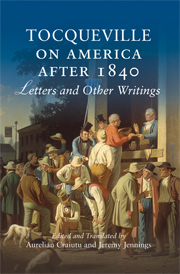Book contents
- Frontmatter
- Contents
- Editors' Note and Acknowledgments
- Interpretative Essay: The Third Democracy: Tocqueville's Views of America after 1840
- PART I LETTERS
- PART II SPEECHES, ARTICLES, AND DIPLOMATIC PAPERS
- General Introduction
- A America in the 1840s
- B America and the Revolution of 1848
- C Tocqueville's Contributions to the Debates on the Constitution of the Second Republic
- D The Poussin Affair
- E Final Thoughts on the American Constitution
- Appendix 1 Tocqueville's American Correspondents
- Appendix 2 Chronology
- Appendix 3 Sources for the Texts and Selected Bibliography
- Notes
- Index
C - Tocqueville's Contributions to the Debates on the Constitution of the Second Republic
Published online by Cambridge University Press: 05 June 2012
- Frontmatter
- Contents
- Editors' Note and Acknowledgments
- Interpretative Essay: The Third Democracy: Tocqueville's Views of America after 1840
- PART I LETTERS
- PART II SPEECHES, ARTICLES, AND DIPLOMATIC PAPERS
- General Introduction
- A America in the 1840s
- B America and the Revolution of 1848
- C Tocqueville's Contributions to the Debates on the Constitution of the Second Republic
- D The Poussin Affair
- E Final Thoughts on the American Constitution
- Appendix 1 Tocqueville's American Correspondents
- Appendix 2 Chronology
- Appendix 3 Sources for the Texts and Selected Bibliography
- Notes
- Index
Summary
Introduction
The April 16, 1848 diary entry of Richard Rush, U. S. Minister to France, reads as follows: “M. de Tocqueville, the well-known author of the celebrated work on the political institutions of the United States, comes to see me. We get into conversation on some of the points of Republican Government. I mention what I had heard of M. Lamartine's objections to a double branch of the Legislative power under the new republic. We converse on this part of the subject. I say that the American experience is all in favor of two branches. For the illustration from history showing the dangers of a single branch and advantages of a double branch, I refer him to the learned and logical work of the elder Adams, formerly President of the United States, and one of the foremost patriots and sages of the American Revolution…M. de Tocqueville seemed familiar with the historical facts and reasoning in favor of the double branch but wished to know what work of repute there was in our country which defended the single branch. I replied, none that I knew of and that not only did the Constitution of the United States establish a double branch in the two houses of Congress, but all the States, amounting to thirty, which composed the federal Union at present, had adopted the double branch; or, if exceptions existed, I was not aware of them.
- Type
- Chapter
- Information
- Tocqueville on America after 1840Letters and Other Writings, pp. 377 - 408Publisher: Cambridge University PressPrint publication year: 2009



